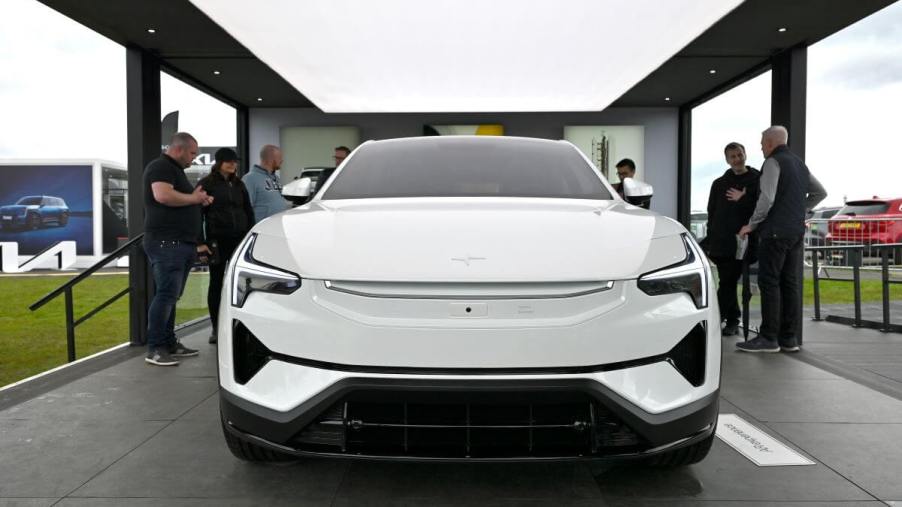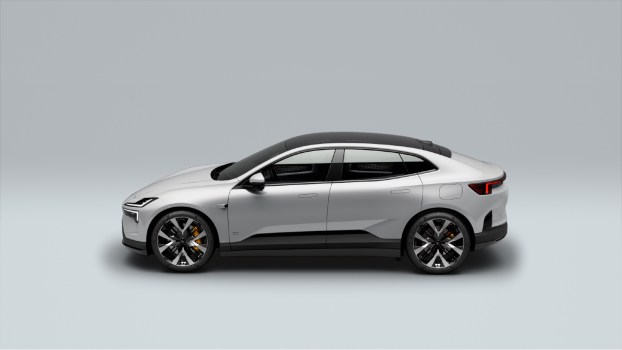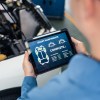
Polestar Is Doubling Down on Its Dealership Network and Unique Sales Approach
Polestar, the all-electric automaker under the wing of Volvo, is banking that its non-traditional network of dealers will prove successful. The small, sleek showrooms are dubbed “spaces” with just a few models on hand. There are no sales representatives, but rather “specialists” that do not earn a commission to help those interested in the EV automaker’s products — currently limited to the Polestar 2 model. Prospective customers use tablets to configure a model to their needs while viewing paint or upholstery samples on the showroom floor.
It’s a far cry from a traditional car dealership, and as Polestar continues to establish itself in the EV segment, the company is all-in on the approach and plans to greatly expand its network. MotorBiscuit recently spoke with Gregor Hembrough, head of Polestar USA, on the brand’s plans to alter how consumers buy cars as the automotive industry enters its electric age.
A different approach to selling cars
Polestar’s new Atlanta space, which has been open since May, showcases the brand’s out-of-the-box approach to selling its cars. Polestar Atlanta is now open in The Battery Atlanta, a large mixed-use development adjacent to the Atlanta Braves’ Truist Park. The showroom accommodates just three cars and lacks the traditional parking lot full of models out back. It is flanked by an upscale convenience store and resides across the street from a restaurant and a boxing gym, where foot traffic is the predominant method of travel. This stands in contrast to most Atlanta-area car dealers, which are often vast complexes lumped together along major highways.
That’s just how Polestar and Hemrbough want it.
“When I go back to 2018 when we enacted this approach, it was something nobody said the customers would want…that you can’t sell cars without having them six deep and six wide or having a negotiation through the process,” Hembrough said. “It’s really trying to look at [selling cars] in a very different way than we used to.”
Polestar Atlanta is the most recent Polestar space to open its doors, where Hembrough says customers can experience a “friction-free” sales process in which they spec out their models online with “transparency is pricing and negotiation.” Additionally, potential buyers can have a model delivered to their home within about 80 miles of the dealership for an overnight test drive.
It remains to be seen if Polestar’s approach will pay dividends in attracting consumers. Still, in the meantime, the all-electric brand under the umbrella of Volvo has its sights set on significantly expanding its network of showrooms.
‘Just the beginning’ of Polestar’s U.S. expansion
Hembrough says Polestar initially kept its showrooms limited to EV-friendly environments like California. However, as the fledging automaker is on the precipice of expanding its lineup, it plans to enter more markets.
“We see ourselves probably at about 75 to 80 Polestar locations nationwide by 2025, and we’re right at about 30 at this point,” he said. “But our viewpoint is, let the demand for the cars fill that rather than having everyone run out and build spaces. We’re just at the beginning.”
Hembrough says Polestar’s showrooms won’t be on every street corner but that it plans to expand to Las Vegas, Nevada, Sacramento, California, and Ft. Lauderdale, Florida, while potentially adding second locations in Boston and Los Angeles in the near term.
Future locations will also have more models on the showroom floor. The Polestar 2 is currently the brand’s only offering, but the Polestar 3 midsize SUV is set to launch for the 2024 model year, followed by the Polestar 4 fastback SUV, which Hembrough says will begin arriving soon. Additionally, the Polestar 5 full-size electric sedan and Polestar 6 EV roadster are also in the works.
A fledgling automaker and a radically altering automotive industry
Polestar occupies a unique position among automotive brands, complementing its unique dealership approach. It only produces fully electric vehicles and is a relative newcomer to the fray as a stand-alone company under Volvo. Through this connection, Polestar vehicles are serviced at Volvo shops, allowing Polestar to continue its showroom versus traditional dealership approach.
Hembrough says some might feel trepidation about purchasing a car from a relatively unproven brand but claims Polestar’s affiliation with Volvo means it is “a 97-year-old startup.”
For Hemrbough, that hopefully translates to buyer confidence for those considering purchasing a Polestar, though he says the automaker has already encountered its share of growing pains. The pandemic and its far-reaching impacts on the automotive sector are still being felt, and regulations, even those intended to spur EV adoption, have their own downsides.
“The Inflation Reduction Act that was brought in last August was really meant to catalyze EV adoption, and as a spectator and a stakeholder, it’s really paralyzed [EV] adoption,” Hembrough said. “It left customers with a lot of confusion on what cars had the $7,500 [federal tax] incentive. Am I eligible now because my salary looks like this? Is the car eligible because it’s not made in North America? There’s a lot of misunderstanding about what’s relevant to the customer. It’s something we continue to monitor because I think there was a bit of a stutter among EVs for a while.”
However, Hembrough says as the federal law’s directives have become clearer, EV adoption is beginning to hit stride again. He and Polestar believe that will drive the success of the brand’s unique approach to sales.




